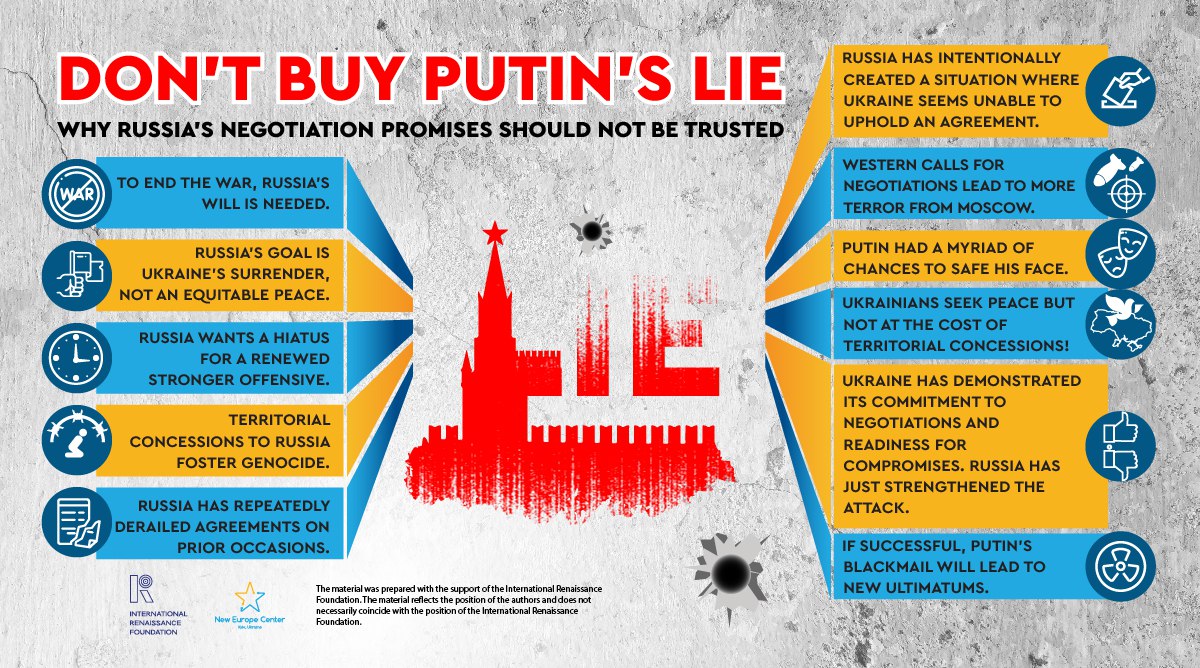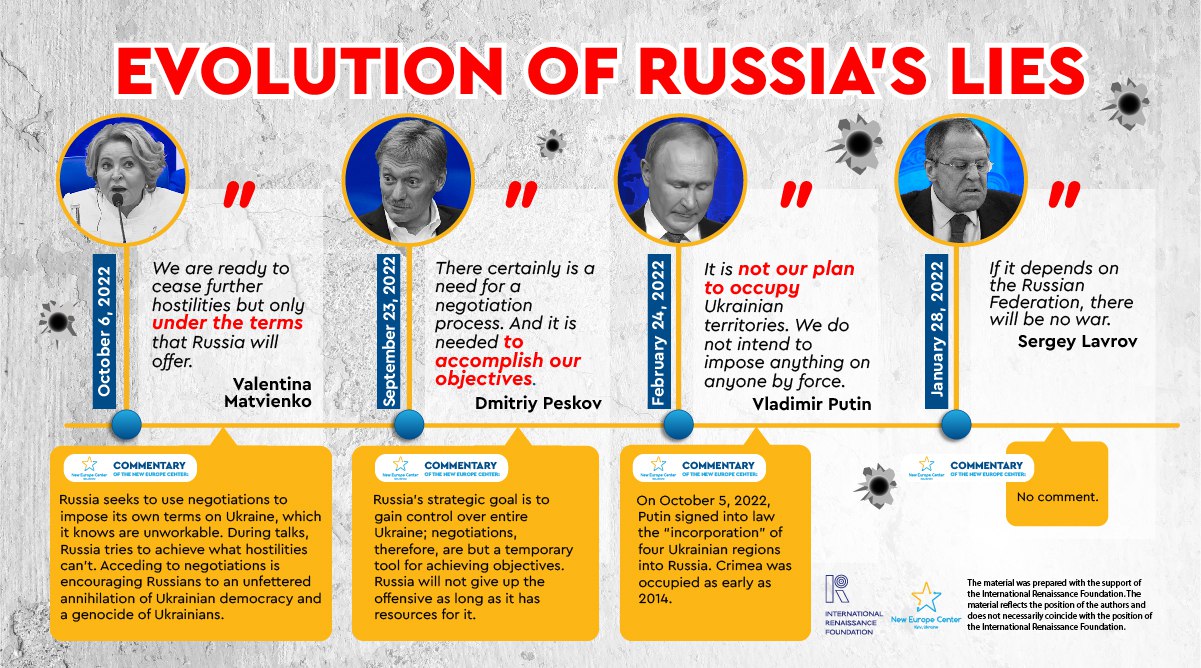- To end the war, Russia’s will is needed.
For the second time in 8 years, Ukraine has fallen prey to Russia’s unprovoked aggression, including the full-scale invasion. The war will end the moment Russia stops shooting and leaves the occupied territories.
- Russia’s goal is Ukraine’s surrender, not an equitable peace.
Russia’s ends in the war – establishing a puppet regime in Ukraine – have not changed since 2014. Neither the occupation of Crimea, nor the occupation of a part of Donbas will suffice for Moscow, hence Russia’s full-blown war in 2022. Eight years should have been enough to understand: Russia says one thing and does another.
- Russia wants a hiatus for a renewed stronger offensive.
Enticement to negotiations is a tactical maneuver to dull the vigilance of other countries and recover from defeats on the front. Mobilization and switching defense enterprises to 12-hour workdays indicate one thing: a ceasefire, if it does occur, will be temporary. After a while, Russia’s renewed offensive would be inevitable, since Moscow has not accomplished its primary objectives in the war.
- Territorial concessions to Russia foster genocide.
As of now, an array of war crimes committed by Russian citizens in Ukraine have been documented by the UN Commission. Peace at the cost of territorial concessions will be premised on tens of thousands of new casualties, even in the absence of hostilities. Russian propaganda continues calling on its troops to commit genocidal acts – annihilate Ukrainian nation.
- Russia has repeatedly derailed agreements on prior occasions.
The Minsk Accords were repeatedly thwarted by Russia. For instance, in contravention of the accords, Moscow held illegal elections in the temporarily occupied territories of Donetsk and Luhansk regions on November 2, 2014. In February 2015, it continued the conduct of hostilities, despite the decision on a ceasefire made earlier. A new agreement will become a new “Minsk accord” at its worst, which Russia will violate at any convenient moment.
- Russia has intentionally created a situation where Ukraine seems unable to uphold an agreement.
Kyiv made it clear that the occupation of Ukrainian lands will rule out the possibility of negotiations. Regardless of that, Putin still resorted to carrying out “pseudo-referendums” in the occupied territories. Acceding to negotiations under such conditions would equal announcing surrender and emboldening Russia to get on with the genocide with the tacit consent of the whole world.
7. Western calls for negotiations lead to more terror from Moscow.
Panicked calls for negotiations from Western officials or famous persons, which Russia sees as weakness, encourage it to use terror and attacks against the civilian sector to force the West and Ukraine into ultimately giving up the liberation struggle. Russia understands nothing but the language of force, so it is only the unity of Ukraine and the world’s democracies that will bring about victory and a lasting peace.
8. Putin had a myriad of chances to safe his face.
It was through intimidation that Putin emerged triumphant time and again, pretending to be an irrational actor. The West should not fall for the Russian trick about saving the face of Putin, who is driven into the corner. He had and still has enough opportunities to create a semblance of victory via his own propaganda. More than 70 percent of Russians support the war only because Putin started it; the same 70 percent will gladly support peace if Putin is the one to initiate it. No one is better positioned to save Putin’s face than himself.
9. Ukrainians seek peace but not at the cost of territorial concessions!
Ukraine is most eager to attain peace, but a fair and lasting one that would restore stability and stop the bloodshed on its soil. The only way to it is giving Ukrainians all the tools for victory. Negotiations have to take place in response to the Ukrainians’ declaration, not Putin’s pathetic blackmail. The overwhelming majority of Ukrainians (87 percent) are not ready to make any territorial concessions for the sake of ending the war with Russia as soon as possible[1]. Even in the east of the country – the area afflicted by intense combat – 85 percent of people are against concessions, as compared to 10 percent who are ready to make them.
10. Ukraine has demonstrated its commitment to negotiations and readiness for compromises. Russia has just strengthened the attack.
Ukraine clearly showed its determination to hold talks as early as during the ongoing full-scale invasion: in Istanbul this year, it put forward a proposal with very painful trade-offs (particularly, giving up its NATO bid). In return, however, Ukraine saw Russia’s intensified offensive, new war crimes in different cities and the obstruction of the grain deal.
11. If successful, Putin’s blackmail will lead to new ultimatums.
If we succumb to blackmail, Putin will use it on and on. While nuclear threats should be taken seriously, they cannot serve as an argument for Ukraine – a country that renunciated one of the largest nuclear arsenals – to give up its territories. The blackmailer sees when his threats work.













